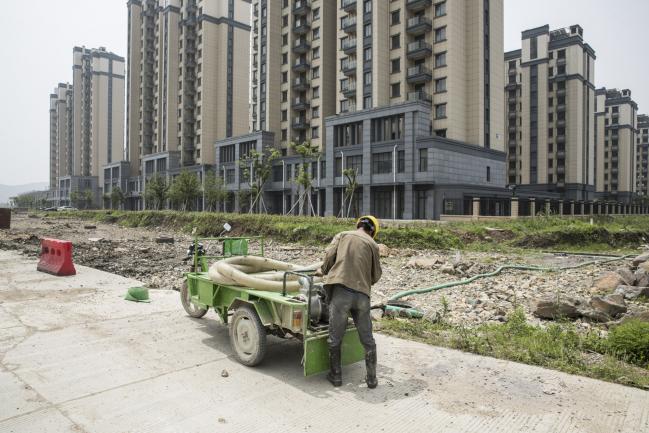(Bloomberg) -- A mad scramble by Chinese property developers to build up their land banks is taking its toll on the industry’s creditworthiness, with builders singled out as having the highest risk of default as channels of credit tighten.
The Bloomberg Default risk model, which tracks metrics including share performance, liabilities and cash flow, shows a 0.87 percent average probability that builders will renege on its obligations in the next 12 months. While the proportion may look small, it’s triple the likelihood of delinquency in the technology industry. About three-quarters of developers have seen their default risk climb over the past year, Bloomberg data show.
“Investors need to pay attention to the fundamentals of issuers that have lots of debt maturing,” said Li Shi, general manager of rating and bond research department at China Chengxin International Credit Rating Co., which estimates that property developers saw the worst deterioration in cash flows among industries last quarter. “They should also watch out for builders that have rising short-term debt and worsening liquidity.”
Builders have loaded up on debt to expand their land holdings in China’s property market, which has boomed over the past decade thanks to urbanization and the growth of the middle class. Total property values in China amount to some $22 trillion, according to Pacific Investment Management Co. And until early this year, that strategy won the applause of stock investors for big players like China Vanke Co. and China Evergrande Group.
With China’s economic growth now slowing, and its policy makers proceeding -- albeit carefully -- with a financial deleveraging campaign -- the proverbial chickens are coming home to roost. Facing a record amount of maturing debt, the challenge is on for developers to find ways to refinance. Some are getting creative, such as China Vanke’s move to sell floating-rate notes in dollars last month.
Defaults
For others, creativity hasn’t been enough. Wuzhou International Holdings said this month it defaulted on debts. Zhonghong Holding Co. said Wednesday it had overdue borrowing of 3.5 billion yuan.
“It is highly conceivable that more sporadic credit events may emerge in this sector as the refinancing wall looms in the second half” as developers with less access to bank loans struggle, said Desmond Kuang, portfolio manager at Income Partners Asset Management (HK) Ltd.
Chinese builders have to repay 625 billion yuan bonds ($96 billion) in the domestic and overseas markets combined through 2019, according to data compiled by Bloomberg. The number balloons to 1.2 trillion yuan if put options are exercised.
Given the property market’s importance to China’s economy, policy makers are unlikely to allow financing troubles to become systemic. They’ve already shown flexibility in putting off a deadline to tighten regulation of the asset-management industry, and lowered banks’ required reserve ratios. The government will use monetary policy to boost funding supply for smaller firms, an official report showed Wednesday.
Even so, “absent a change in policy which significantly eases financial conditions,” Paul Lukaszewski, at Aberdeen Standard Investments Ltd. for one expects delinquencies to rise.
“The Chinese corporates which have financed themselves on a shorter-term basis are increasingly at risk of stumbling into potential defaults,” said Lukaszewski, head of Asian corporate debt and emerging market credit research for the asset manager in Singapore.
To contact Bloomberg News staff for this story: Lianting Tu in Hong Kong at ltu4@bloomberg.net;Jing Zhao in Beijing at jzhao231@bloomberg.net
To contact the editors responsible for this story: Neha D'silva at ndsilva1@bloomberg.net, Christopher Anstey
©2018 Bloomberg L.P.
